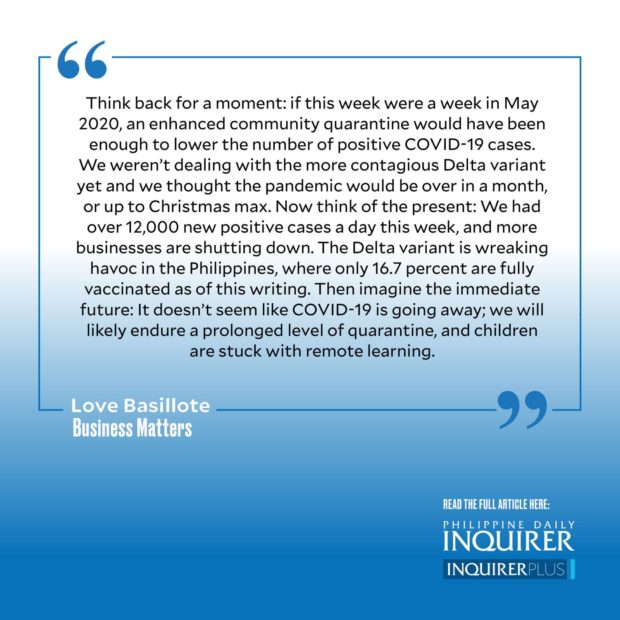Think back for a moment: if this week were a week in May 2020, an enhanced community quarantine (ECQ) would have been enough to lower the number of positive COVID-19 cases.
We weren’t dealing with the more contagious Delta variant yet and we thought the pandemic would be over in a month, or up to Christmas max. Now think of the present: We had over 12,000 new positive cases a day this week, and more businesses are shutting down.
The Delta variant is wreaking havoc in the Philippines, where only 16.7 percent are fully vaccinated as of this writing. Then imagine the immediate future: It doesn’t seem like COVID-19 is going away; we will likely endure a prolonged level of quarantine, and children are stuck with remote learning.
It is humbling to accept that our attempts at handling the pandemic have not allowed us to come out of this pandemic relatively unscathed even after a year, as we had hoped. Given where we stand, we renew our call for a rethinking of learning for all, and for a convening of a multisectoral Education Commission (EdCom).
The Philippines’ poor showing in the Programme for International Student Assessment and the growing research on the impacts of the 4th Industrial Revolution were what prompted our call in 2019 for an EdCom. The learning crisis is a multiplayer, multisectoral, and multiyear problem that prompts a rethinking of how we structure and deliver education and workforce development. The threat of jobs becoming obsolete and the emerging skills needed in this new economic model necessitate innovations in how we develop curricula, train our teachers, and give credentials.
The protracted COVID-19 pandemic and its shocks to our education system make the call for an EdCom even more salient. This week, Unicef reported that the Philippines is one of only five countries in the world that have not reopened their schools since the pandemic started. Students, parents, and teachers have been having a hard time with distance learning, given the wide digital divide, increased costs of goods, and limited resources. This scenario will probably extend into the next school year.
The good news is that the EdCom resolutions we at the Philippine Business for Education have pushed for are already moving in Congress, thanks to the leadership of legislators. The Senate committee on education, chaired by Sen. Sherwin Gatchalian, wrapped up the technical working group (TWG) meeting on Aug. 19, 2021. The TWG has reviewed the resolution and is now preparing the report for plenary discussions. The resolution to revive the EdCom was introduced by Senators Gatchalian, Sonny Angara, Joel Villanueva, Grace Poe, Imee Marcos, and Senate Minority Leader Frank Drilon. In the House of Representatives, the committee-level hearings have been concluded as well. Representatives Rommel Angara, Kiko Benitez, Stella Quimbo, and Juan Fidel Felipe Nograles sponsored the resolution.
There are also efforts by the Department of Education to improve education quality by looking at traditional inputs like curriculum development and increasing education budgets. Of the proposed P5 trillion national budget for 2022, the education sector gets the lion’s share at P773 billion, a 2.9 percent increase compared to the previous year. Brigada Eskwela and preparations for the upcoming school year are also underway.
But what this long pandemic has taught us is that many of the crises we face cannot be up to individuals or one agency to solve alone. As we brace for what seems to be another school year challenged by the pandemic’s restrictions on top of existing poor learning outcomes and learning losses, we need a platform that could bring everyone together and bring out interventions in the areas of learning outcomes, teacher quality, technology, and workforce development that are “shock-proof.” A multisectoral EdCom should be that platform.
We envision quality learning for every Filipino, with or without a pandemic. This is why we are calling for the immediate reconvening of an EdCom to address the learning crisis. We invite everyone to echo this urgent call. Any delay will only further damage the future of our country, leaving us with too many what-ifs.
Love Basillote is the executive director of the Philippine Business for Education.
Business Matters is a project of the Makati Business Club (makatibusinessclub@mbc.com.ph).


